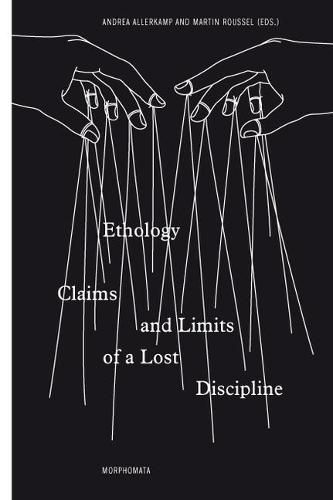Readings Newsletter
Become a Readings Member to make your shopping experience even easier.
Sign in or sign up for free!
You’re not far away from qualifying for FREE standard shipping within Australia
You’ve qualified for FREE standard shipping within Australia
The cart is loading…






When the Werner Reimers Foundation organized a colloquium on Human Ethology in 1977, it was about Claims and Limits of a New Discipline as a bridge between biology and the social sciences and humanities. As a lost discipline, however, the interdisciplinary approach to ethology only takes shape in a dispersed dispositif. This is the framing argument, which derives from the nucleus of ethology, namely that the starting point of all knowledge is the body in its possibilities of movement in time and space to affect and be affected. In their essays (English or German), the contributors to this collection have worked through the heterogeneity of ethological thought - from Spinoza to Jakob von Uexkull, Gregory Bateson, Gilles Deleuze and Felix Guattari, Philippe Descola, or Isabelle Stengers - and practice - as, for example in the works of Virginia Woolf or Marcel Beyer - and have taken it as an opportunity to relocate ethology, I. as an Immanent Ecology, with essays by Kerstin Andermann, Hanjo Berressem, and Verena Andermatt Conley II. in the discussion of Anthropological Contrasts, with essays by Marc Rolli, Mirjam Schaub, and Stefan Rieger, and III. in Ethological Interferences and Practices, with essays by Stephan Zandt, Anthony Uhlmann, and Adrian Robanus A commentary by Sophia Grafe concludes the volume.
$9.00 standard shipping within Australia
FREE standard shipping within Australia for orders over $100.00
Express & International shipping calculated at checkout
Stock availability can be subject to change without notice. We recommend calling the shop or contacting our online team to check availability of low stock items. Please see our Shopping Online page for more details.
When the Werner Reimers Foundation organized a colloquium on Human Ethology in 1977, it was about Claims and Limits of a New Discipline as a bridge between biology and the social sciences and humanities. As a lost discipline, however, the interdisciplinary approach to ethology only takes shape in a dispersed dispositif. This is the framing argument, which derives from the nucleus of ethology, namely that the starting point of all knowledge is the body in its possibilities of movement in time and space to affect and be affected. In their essays (English or German), the contributors to this collection have worked through the heterogeneity of ethological thought - from Spinoza to Jakob von Uexkull, Gregory Bateson, Gilles Deleuze and Felix Guattari, Philippe Descola, or Isabelle Stengers - and practice - as, for example in the works of Virginia Woolf or Marcel Beyer - and have taken it as an opportunity to relocate ethology, I. as an Immanent Ecology, with essays by Kerstin Andermann, Hanjo Berressem, and Verena Andermatt Conley II. in the discussion of Anthropological Contrasts, with essays by Marc Rolli, Mirjam Schaub, and Stefan Rieger, and III. in Ethological Interferences and Practices, with essays by Stephan Zandt, Anthony Uhlmann, and Adrian Robanus A commentary by Sophia Grafe concludes the volume.